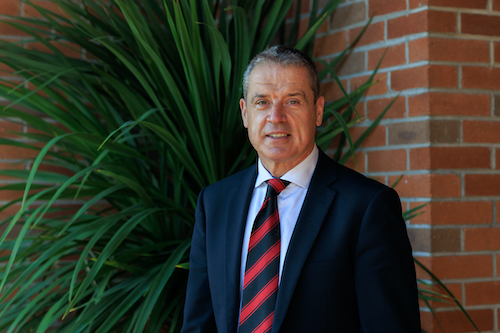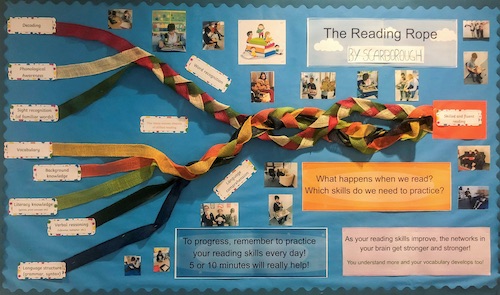
Local Teachers who Blog for knowitall.ch
Instead of asking teachers or staff from one particular school in the area, we've decided to host all of them under one heading.
We expect great things to happen on this page, so make sure to check often to read their stories, insights, explanations, and thoughts on education for children, adults, special needs, or extra-curricular.

Press release, August 2022
British School of Geneva (BSG), the well-known, long-standing English language school for children aged 4-18 has just appointed Simon Thompson as its new Principal.
Mr. Thompson started in August 2022 and joins BSG from Kilkenny College in Ireland, where he was Headmaster. He replaces Mark McCullough, who is returning to his native Northern Ireland.
Mr. Thompson will bring nearly 20 years of experience as a Headmaster to BSG. Under his leadership, Kilkenny College has developed as Ireland’s largest and most successful co-educational boarding and day school, with 960 students and more than 140 staff.
Mr. Thompson joins BSG at a time of exciting growth with strong demand for places for the 2022-23 academic year. Commenting on Mr. Thompson’s appointment, Philippe Grosskost, managing director of International Schools Partnership – Europe, which owns BSG, said: “BSG is a growing school, which is testament to the outstanding work of the whole staff. Simon joins at an exciting time and has exactly the right leadership skills to guide BSG on the next stage of its journey. Most importantly, he has a very strong track record for improving student learning outcomes and will ensure that we continue to help our students achieve the best grades that they can, while making a positive contribution to society as happy, confident individuals.”
Simon Thompson, new Principal of British School of Geneva said: “The role of Principal at BSG is a very exciting one for me. It would always take a lot for me to leave a wonderful school like Kilkenny College, but the opportunity to join another very successful school with a close parent community, was a real draw. I can’t wait to start.”

By Oak Hill Nyon — An individualised and research-based, half-day programme for students with dyslexia and/or AD(H)D
What is dyslexia?
Dyslexia is a specific learning difference that is characterised by difficulties with spelling, vocabulary, decoding, poor word recognition/fluency and/or comprehension challenges. It is often related to deficits in phonological and/or orthographic processing and it is estimated (Yale Center for Dyslexia and Creativity) that it affects approximately 1 in 5 of the population - including many of the young people in our classrooms. As a result, the reading demands of the secondary curriculum often require a greater amount of concentration and focus for individuals with dyslexia.
What’s different about reading in the middle years?
In secondary school, all students are introduced to greater volumes of text (as well as more complex content/vocabulary/concepts). As a result, the student with dyslexia may wonder (or despair!) why reading a play, poetry or a novel is much easier for their friends. They may also feel it is unfair that they have to work so much harder to make the same amount of progress. Perhaps parents or teachers reading this blog have heard these sorts of complaints or comments?
Whatever the situation, teenagers with reading challenges will need just as much support, encouragement, praise and understanding as they did in their primary years! Parents really do have a valued role helping their teenager engage with a text.

By Katie Harwood, Haut-Lac International Bilingual School in Switzerland
The quality of private, Swiss boarding schools has been well known for many years, and still is to this day. Here’s what motivates students to study at a boarding school among the lakes and mountains in the heart of Europe.
Swiss boarding schools are family-oriented
Or, as we say in Switzerland "small is beautiful". The private Swiss boarding school tradition focuses on creating a real home away from home. The boarding solutions offered by schools like Haut-Lac International Bilingual School are developed with the students’ best interests and futures in mind.
Haut-Lac boarders find themselves studying with a maximum of twenty classmates, which enables teachers to adapt their teaching to the students' profiles so that each one has the chance to shine.
This ultimately gives students the confidence they need to find their place in society, as well as making lasting friendships.
The history of Swiss boarding schools is an international attraction
"Swiss boarding school" rhythms with prestige and status. A major advantage many families feel will greatly benefit their children as they go through life.
What’s more schools, universities and companies around the world look highly upon students with the communicative edge, open-mindedness and resilience that such an education provides. By studying in Switzerland, the home of the IB programme, students embark on a pathway that opens not one, but many doors to success in the real world for students.

By Katie Harwood, Haut-Lac International Bilingual School in Switzerland
Many of us might have emerged from the countrywide lockdown having learnt a thing or two about ourselves that we might not have known before. Being kept indoors has been a learning experience of its own, complete with highs and lows like any emotional rollercoaster.
However, this hasn’t been an isolated phenomenon pertaining to adults only. Children and teenagers were also exposed to visions of the world and potential realities they had never before considered. This being the case, they may still be feeling some residual emotion that would be best discussed out in the open. To explore these new feelings properly, they may benefit from deepening their emotional vocabulary to include new sentiments beyond happy, sad, scared and angry. Giving more colour to the words used to describe our emotions makes it much easier to accurately share our feelings.
Practice Talking About Your Own Feelings More Openly
It is natural for parents to want to shield children from certain emotions. However, never seeing any adults displaying difficult emotions can make children feel self-conscious when doing so. In response, they might internalise their feelings, which does not erase them but prevents any constructive discussion taking place.
Every Feeling is Okay
In the same vein, be conscious not to demonise any emotions, as this will encourage children to share their feelings with you. All emotions are natural and a response to something happening in life. The easier they are to talk about, the less they are allowed to dominate the consciousness. Being able to talk about frustration, anxiety, anger etc. means having an outlet to safely release it.

By Katie Harwood, Haut-Lac International Bilingual School
In our previous article about the IBCP (International Baccalaureate Career-Related Programme), we explored the many ways in which the course prepares and enables students for university. Conversely, if you are looking to see how it sets students up for a smooth and positive entrance into the world of work, read on. This article has you covered.
Different from the IBDP (Diploma Programme)
The core components of the IBCP are where your vocational training begins, veering away from the traditional IBDP framework. The IBCP covers everything from extensive work experience, to professional and practical skills development and research capabilities. What’s more, the service learning element will help you to develop a deeper sense of community and cooperation. Thanks to these tools, the confidence and maturity you display when handling adult situations will grow steadily, both in and out of the workplace.
The IBCP will teach you what is expected in terms of attitude, behaviour and practical skills when you enter the professional arena. As one student attests, “They introduce you to the real world. You have to learn a lot of other things, like… about getting jobs, creating your LinkedIn, how you market yourself, how you deal with people who disagree in a way that is productive…”
Such preparation will be visible in the assurance and ease you will later be able to demonstrate in a job setting.
Page 1 of 2






